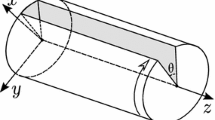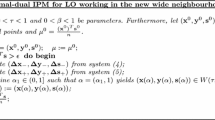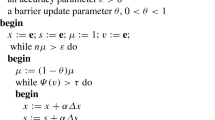Abstract
Two interior-point algorithms using a wide neighborhood of the central path are proposed to solve nonlinear P *-complementarity problems. The proof of the polynomial complexity of the first method requires the problem to satisfy a scaled Lipschitz condition. When specialized to monotone complementarity problems, the results of the first method are similar to those in Ref. 1. The second method is quite different from the first in that the global convergence proof does not require the scaled Lipschitz assumption. However, at each step of this algorithm, one has to compute an approximate solution of a nonlinear system such that a certain accuracy requirement is satisfied.
Similar content being viewed by others
References
Sun, J., and Zhao, G., Global and Local Quadratic Convergence of a Long-Step Adaptive-Mode Interior-Point Methods for Some Monotone Variational Inequality Problems, SIAM Journal on Optimization, Vol. 8, pp. 123–139, 1998.
Cottle, R. W., Pang, J. S., and Stone, R. E., The Linear Complementarity Problem, Academic Press, New York, New York, 1992.
Isac, G., Complementarity Problems, Lecture Notes in Mathematics, Springer Verlag, Berlin, Germany, Vol. 1528, 1992.
Harker, P. T., and Pang, J. S., Finite-Dimensional Variational Inequality and Nonlinear Complementarity Problems: A Survey of Theory, Algorithms, and Applications, Mathematical Programming, Vol. 48, pp. 161–220, 1990.
McLinden, L., The Analogue of Moreau's Proximation Theorem, with Application to the Nonlinear Complementarity Problem, Pacific Journal of Mathematics, Vol. 88, pp. 101–161, 1980.
Anderson, E., and Ye, Y., On a Homogeneous Algorithm for the Monotone Complementarity Problem, Technical Report, Department of Management Sciences, University of Iowa, Iowa City, Iowa, 1995.
GÜler, O., Path-Following and Potential Reduction Algorithm for Nonlinear Complementarity Problems, Working Paper, Department of Management Sciences, University of Iowa, Iowa City, Iowa, 1991.
Jansen, B., Roos, C., and Terlaky, T., A Family of Polynomial Affine Scaling Algorithms for Positive-Semidefinite Linear Complementarity Problems, SIAM Journal on Optimization, Vol. 7, pp. 126–140, 1997.
Jansen, B., Roos, C., Terlaky, T., and Yoshise, A., Polynomiality of Primal-Dual Affine Scaling Algorithms for Nonlinear Complementarity Problems, Mathematical Programming, Vol. 78, pp. 315–345, 1997.
Kojima, M., Megiddo, N., Noma, T., and Yoshise, A., A Unified Approach to Interior-Point Algorithms for Linear Complementarity Problems, Lecture Notes in Computer Sciences, Springer Verlag, Berlin, Germany, Vol. 538, 1991.
Kojima, M., Megiddo, N., and Ye, Y., An Interior-Point Potential Reduction Algorithm for the Linear Complementarity Problem, Mathematical Programming, Vol. 54, pp. 276–279, 1992.
Kojima, M., Mizuno, S., and Noma, T., A New Continuation Method for Complementarity Problems with Uniform P-functions, Mathematical Programming, Vol. 43, pp. 107–113, 1989.
Kojima, M., Mizuno, S., and Yoshise, A., A Polynomial-Time Algorithm for a Class of Linear Complementarity Problems, Mathematical Programming, Vol. 44, pp. 1–26, 1989.
Kojima, M., Mizuno, S., and Yoshise, A., An O(n 1/2 L) Iteration Potential Reduction Algorithm for Linear Complementarity Problems, Mathematical Programming, Vol. 50, pp. 331–342, 1991.
Miao, J. M., A Quadratically Convergent O((κ + 1)n 1/2 L) Iteration Algorithm for P * -Matrix Linear Complementarity Problems, Mathematical Programming, Vol. 69, pp. 355–368, 1995.
Mizuno, M., Todd, M. J., and Ye, Y., On the Adaptive-Step Primal-Dual Interior-Point Algorithms for Linear Programming, Mathematics of Operations Research, Vol. 18, pp. 964–981, 1993.
Potra, F. A., and Ye, Y., Interior-Point Methods for Monotone Complementarity Problems, Journal of Optimization Theory and Applications, Vol. 88, pp. 617–642, 1996.
Sun, J., Zhu, J., and Zhao, G., A Predictor-Corrector Algorithm for a Class of Nonlinear Saddle-Point Problems, SIAM Journal on Control and Optimization, Vol. 35, pp. 532–551, 1997.
Tseng, P., An Infeasible Path-Following Method for Monotone Complementarity Problems, SIAM Journal on Optimization, Vol. 7, pp. 386–402, 1997.
Ye, Y., A Further Result on the Potential Reduction Algorithm for the P-Matrix Linear Complementarity Problems, Advances in Optimization and Parallel Computing, Edited by P. Pardalos, North-Holland, New York, New York, pp. 310–316, 1992.
Ye, Y., and Pardalos, P. M., A Class of Linear Complementarity Problems Solvable in Polynomial Time, Linear Algebra and Its Applications, Vol. 152, pp. 2–17, 1991.
Ye, Y., and Anstreicher, K. M., On Quadratic and O(n 1/2 L) Convergence of Predictor-Corrector Algorithms for LCP, Mathematical Programming, Vol. 62, pp. 537–551, 1993.
Potra, F. A., and Sheng, R., Predictor-Corrector Algorithm for Solving P * (τ)-Matrix LCP from Arbitrary Positive Starting Points, Mathematical Programming, Vol. 76, pp. 223–244, 1996.
Potra, F. A., and Sheng, R., A Large-Step Infeasible-Interior-Point Method for the P * -Matrix LCP, SIAM Journal on Optimization, Vol. 7, pp. 318–335, 1997.
Potra, F. A., and Sheng, R., A Superlinearly Convergent Infeasible-Interior-Point Algorithm for Degenerate LCP, Computational Mathematics Report, Department of Mathematics, University of Iowa, Iowa City, Iowa, 1994.
Sun, J., and Zhao, G., A Quadratically Convergent Polynomial Long-Step Algorithm for a Class of Nonlinear Monotone Complementarity Problems, Technical Report, Department of Mathematics, National University of Singapore, Singapore, 1995.
Tseng, P., Global Linear Convergence of a Path-Following Algorithm for Some Monotone Variational Inequality Problems, Journal of Optimization Theory and Applications, Vol. 75, pp. 265–279, 1992.
Zhu, J., A Path-Following Algorithm for a Class of Convex Programming Problems, Zeitschrift für Operations Research, Vol. 36, pp. 359–377, 1992.
Wu, J. H., A Modified Primal-Path-Following Scheme for the Monotone Variational Inequality Problem, Journal of Optimization Theory and Applications, Vol. 95, pp. 189–208, 1997.
VÄliaho, H., P * -Matrices Are Just Sufficient, Linear Algebra and Its Applications, Vol. 239, pp. 103–108, 1996.
VÄliaho, H., Determining the Handicap of a Sufficient Matrix, Linear Algebra and Its Applications, Vol. 253, pp. 279–298, 1997.
Zhao, Y. B., and Han, J. Y., Exceptional Family for a Variational Inequality and Its Applications, Journal of Global Optimization, Vol. 14, 1999.
Author information
Authors and Affiliations
Rights and permissions
About this article
Cite this article
Zhao, Y.B., Han, J.Y. Two Interior-Point Methods for Nonlinear P *(τ)-Complementarity Problems. Journal of Optimization Theory and Applications 102, 659–679 (1999). https://doi.org/10.1023/A:1022606324827
Issue Date:
DOI: https://doi.org/10.1023/A:1022606324827




